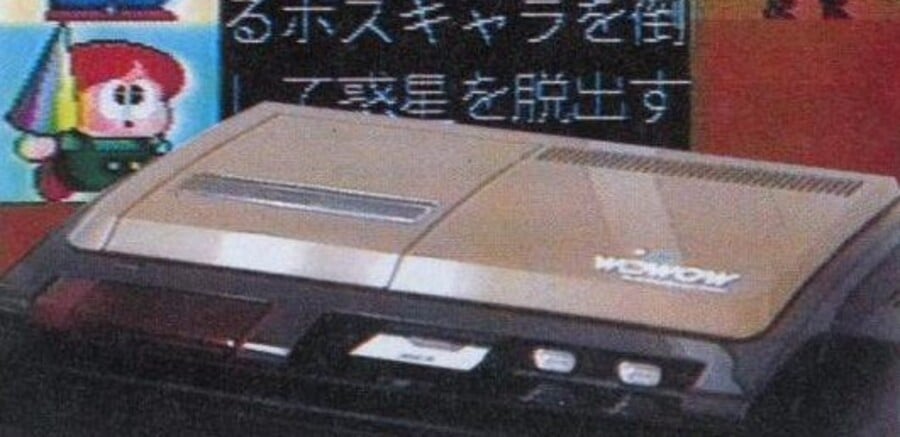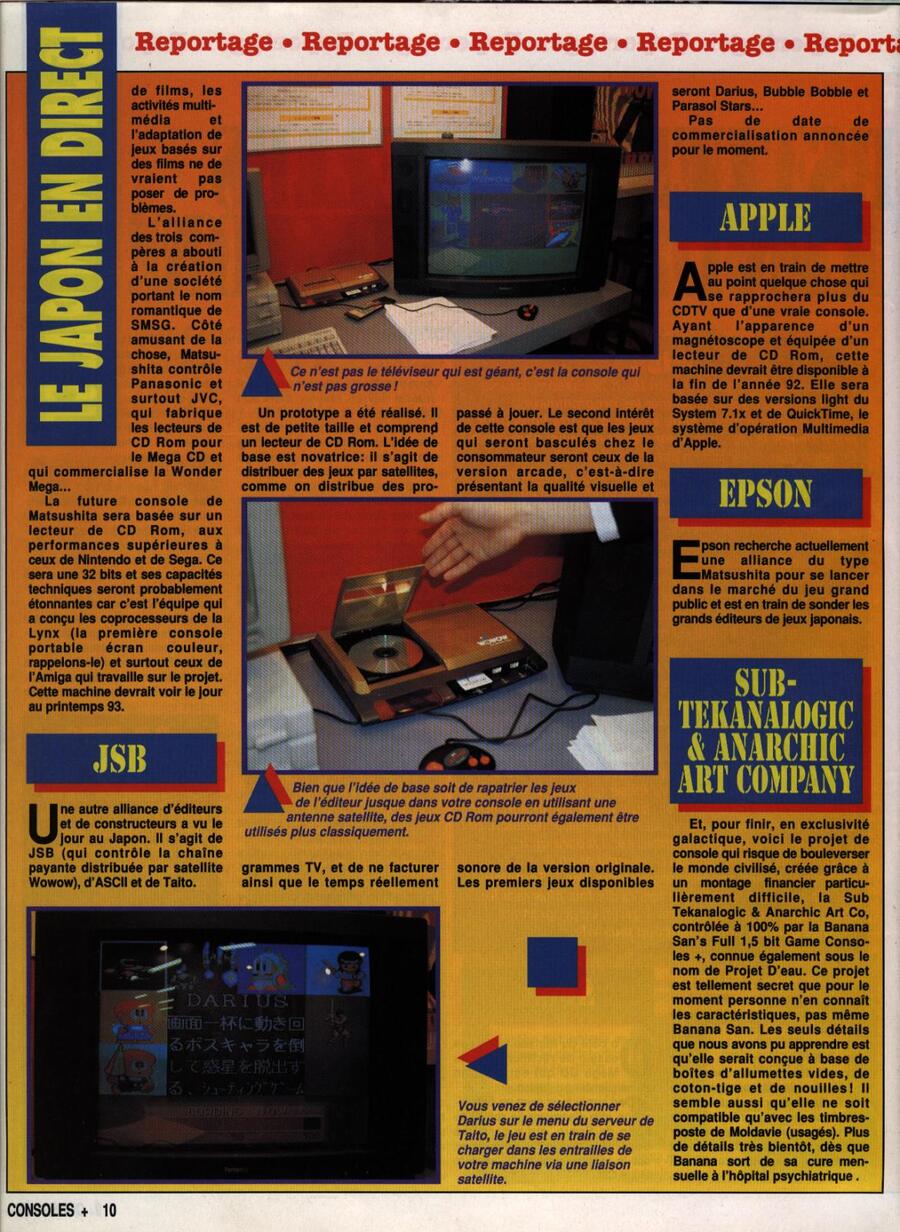
Taito may now be a part of super-publisher Square Enix, but the history books will honour the company as one of gaming's true pioneers. It was responsible for Space Invaders - arguably one of the most important games of all time - as well as a string of '80s and '90s arcade hits, including Darius, Bubble Bobble, Rainbow Islands and Operation Wolf.
However, Taito wasn't always content with merely being a producer of content for the arcade and console markets. In the early '90s it very nearly entered the home hardware race with its own system, and even got as far as showing it off at the 1992 Tokyo Toy Show. The system in question was dubbed WOWOW and would offer the ability to download arcade-perfect ports of hit Taito titles via a satellite data link.
A joint venture between Taito, ASCII and JSB - the latter of which owned the satellite channel from which the console took its name - WOWOW never made it to market and has since slipped into relative obscurity.
Unseen64 has recently been able to make contact with the R&D manager on the project, Yukiharu Sambe, and he gives an insight into why the console never got past the prototype stage.
Q: How the WOWOW project started? What was the idea behind it?
YS: Japanese administrator had a plan of data broadcasting. Meanwhile, I wanted to deliver games to home television set. And I happen to know, JSB is trying to combine CPU and memories on its satellite receiver. I talked to JSB and project started.Q: Why there was a partnership with the broadcaster JSB and ASCII corporation?
YS: JSB has their own satellite and its channel, ASCII has developing satellite data communication systems.Q: Could you describe me in details your role in the WOWOW project?
YS: I was a manager of new technology R&D in TAITO at this time. I directed some of Taito young engineers and develop/designed this wowow game console, include hardware, sample game programs and menu selection programs.Q: The console was based on some specific arcade hardware?
YS: I selected and modified arcade video game hardware because I used to it.
Q: How the satellite connection worked? How did you use the satellite: to download games, to stream games? How did you pay for the service?
YS: JSB satellite had not only video broadcasting channel but data stream channel also. Taito send date stream to JSB satellite base(which was located near Tokyo) through RJ45 connector and JSB transfer these stream to satellite. Home receiver detect these data flow and store it into receiver memory. If subscriber select game play, on memory game program will run. We responsible to the game delivery, JSB responsible to satellite communication and ASCII responsible data interfaces. We intended to collect the game subscriber fee through JSB.Q: What games were planned for the console? Were there mostly arcade ports?
YS: We have to think about the game memory size. Small size was best and I planned to use some early 80's arcade games (they are small size). As a demonstration and presentation game, we modified and minimized the game 'Darius'.Q: Were there any exclusive games designed for the console?
YS: We modified the 'Darius' only as a game. We developed menu selection software which had original graphics and sound also.Q: Why the project was cancelled? Too much competition? Technical problems? The satellite technology was not good enough?
YS: We had two reasons to suspend this project. One: Data transferring speed was not enough and many error correction packets eat up these precious data speed. User should wait more than several minutes to download one small game. And if we try to broadcast several games at the same time, the download time needs more time. Second: At the beginning, JSB intended to combine game hardware in the home satellite receiver. However, memory was expensive and all combined receiver made the cost estimation very high. 5 years later, Nintendo absorbed satellite music company 'St.GIGA' and started their satellite download business in 1995. The data stream was almost same structure that we designed. Nintendo use their game console with special satellite game equipment, however, Nintendo did not make good success on this business. They had similar difficulties that we encountered before.
The Nintendo system that Sambe mentions is the SNES-based Satellaview, which only launched in Japan and was not considered to be a success.
These days, the idea of downloading a game to your console is as natural as popping in a disc, but back in 1992 it was truly ground-breaking stuff, and we personally would have jumped at the chance to download arcade-perfect versions of Rainbow Islands and Darius in our living room. Alas, WOWOW never got off the ground and Taito's home console aspirations died with it. Like the recently unearthed SNES PlayStation, it remains an intriguing footnote in the history of the home console market.
The scan below is taken from French magazine Console+ and shows the system in action:

This article was originally published by nintendolife.com on Tue 11th August, 2015.
[source unseen64.net]






Comments 12
so this is where sony got there design for the ps3 (slim) from
The grammar in this is quite bad. It gave me a headache trying to read it.
@6ch6ris6 The contemporary PC-Engine Duo R wasn't too far off from that in terms of overall layout (except the CD bay on that was on the right).
The French article speaks that apparently Parasol Stars and Bubble Bobble were also planned for the system and judging from a screenshot in it, Kiki Kaikai, aka Pocky a Rocky, was also a candidate for a port to the system. The French scan also says games could be played from a CD instead of being downloaded. The interesting part is that, from what they imply, you would not have paid for the full game but rather you'd have paid for the time spent playing, so it would have been really a rental service it seems (that's what the Console + article says anyway).
thats a really cool article. thx!
Huh. You learn something new everyday.
What's up with the grammar?
Japanese translation. .
I've heard of the console before, it didn't happen just because it was obviously ahead of it's time. Taito should be applauded for thinking like this way back in 1992 though, cause downloading games is a normal thing now
I hate subscription based gaming. I'm a collector, so this wouldn't be of any value to me, period.
Interesting to find about these would have been-consoles. I wonder how many mystery consoles there still are of which I´ve never heard about before?
Would it have been that hard to fix his grammar rather than do a bad transcribing to make him seem so stereotypical and difficult to read?
@AG_Awesome Yes
Show Comments
Leave A Comment
Hold on there, you need to login to post a comment...